|

As we approached the islands, we sailed along with this gaff-rigged
schooner. It was quite windy so only a few sails were in use and the
2 mainsails were reefed.

This is one of the islands. People are packed tightly on those
islands that are inhabited. The vast majority of the islands,
including the one where we wanted to go snorkel, are uninhabited.


After we boarded the tender, I took this shot of the loading
platform on the side of the ship through the window.
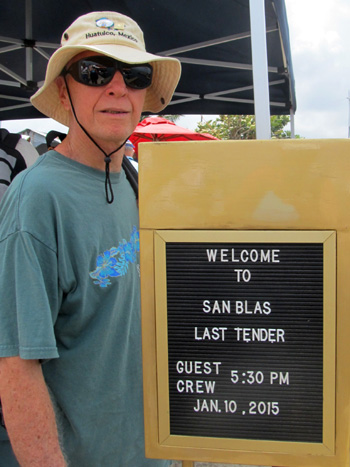 
The people were ready for us with their famous embroideries called
molas that use multiple layers of brightly-colored fabric carefully cut and
bound to display specific colors. We learned that the basic patterns
were based on the traditional body tattoos.




Women and children, dressed in traditional garb, posed for photos
and asked each photographer for $1. Many held green parakeets, but
this girl looks totally bored.






Another couple on our tender had their snorkel gear as well, but no
one approached us with an offer for a boat ride to the other island,
so we went looking for a boat. Most pathways to the water ended up
looking like this one with a rickety dock and some dugout canoes.

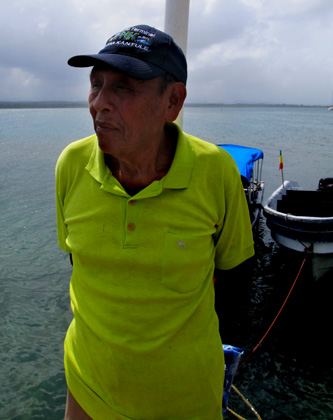
After a number of dead ends, we found a pier with some boats
with outboards. One boat was leaving with some passengers to the
mainland and would be back in 25 minutes. The guy in the yellow
shirt spoke a little English and appeared to be in charge. We
waited, but when it returned the driver was reluctant and asked for
too much money—$50 each. We continued to search...
 
Note the forked sticks used to hold power lines coming from
generators and solar panels.

The solar panels were cleverly hidden from the main
pathways. We weren't supposed to see the boys with their smart
phones either.

There are no sandy beaches, but even if there were, you wouldn't
want to go in the water because those are outhouses at the end of
each pier.


We found a circuitous route to another dock with motor boats and
this was the gas dock with the gas stored in the 55-gallon barrels. The guys
here suggested that we go back to the first dock, so we gave up and
headed back to the tender dock. We'd had a pretty good tour of what
there was to see here.

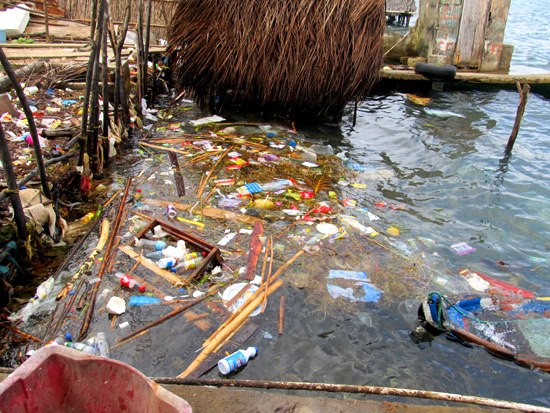
Some of those dugout canoes seem to leak at a pretty rapid rate.
This is my own western view, but I'd think that for a society so
dependent on water that they would treat it with more care.

The line for the tender back to the ship is already pretty long, but
once we made our way over to the right dock, they were boarding the
next tender.

Back on the ship, quite a number of local boats had motored out to
beg at the side of the ship. These boys were chanting, "Throw
money. One dollar!"

Even small babies are carried out in these precarious-looking boats. Dean's
log: San Blas Islands. We
stayed at anchor there until almost 9pm, when we slowly made our way
to the entrance of the Panama Canal. Our call time for passage was
5am. We've been through the canal twice in 2012, so refer back to
that trek page for
details on the canal's history, charts, diagrams, and inner
workings.


Even though we'd been through the canal twice, we put on our
lightweight, long-sleeved shirts and wide brim hats to participate.
It was a nice sunrise...
 
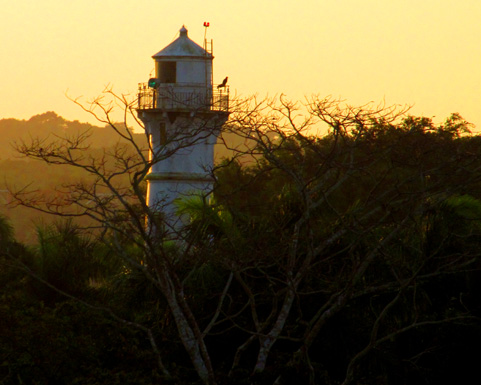

This is the first time the bow was open, so we took our selfie with
the Grand World Voyage decal on the front of the ship.
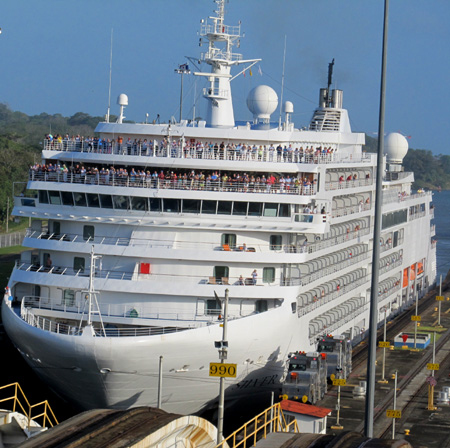
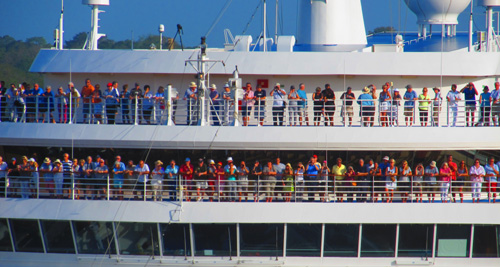
The Silver Spirit was next in the convoy and followed us through the
locks, Gatun Lake, and then the Miraflores Locks.


We picked up a hitchhiker on our way through the locks—a skipper
butterfly. The Wind Spirit, a 4-masted cruise ship circled around us
as we entered Gatun Lake. It must have come in the Pacific side and
probably went out the same way or maybe it spent the night in the
lake.

There is one area where you can see the progress in the new large
locks that are being built for the super-sized ships. After looking
this photo, I went back to the shots we took in 2012 to check out
the progress. Back then, they were predicting that the large locks
would be completed by 2014—in time for the canal's centennial
celebration. Well that didn't happen, but we can see some large
cement structures in the upper left of the photo that were not there
3 years ago. Still there's a long way to go and they say, that
they'll be done next year for sure. The canal provides a
professional commentator
that rides with the cruise ships to provide history and highlights
of the 8-hour passage. Our commentator conveyed the prediction of
completion just as the one had done 3 years ago.

This was approximately the same view in fall of 2012.

The commentator told us that Manuel Noriega is being held at this
jail.
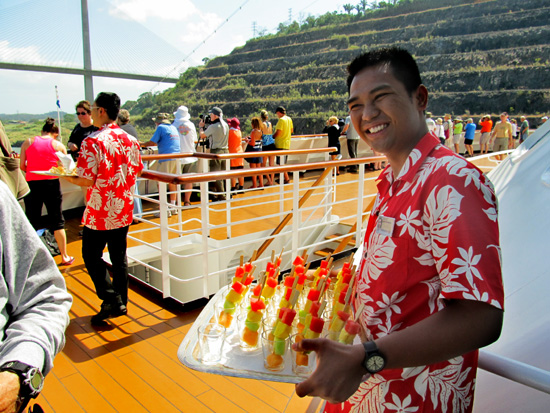

The crew does take good care of us from food and beverages to
chilled, damp washcloths.

A great white heron flew over the boat as we left the last lock. Now
we were in the Pacific and we have just one more stop in South
America before we head across the ocean—Manta, Ecuador. Dean's
log: Panama Canal.
|